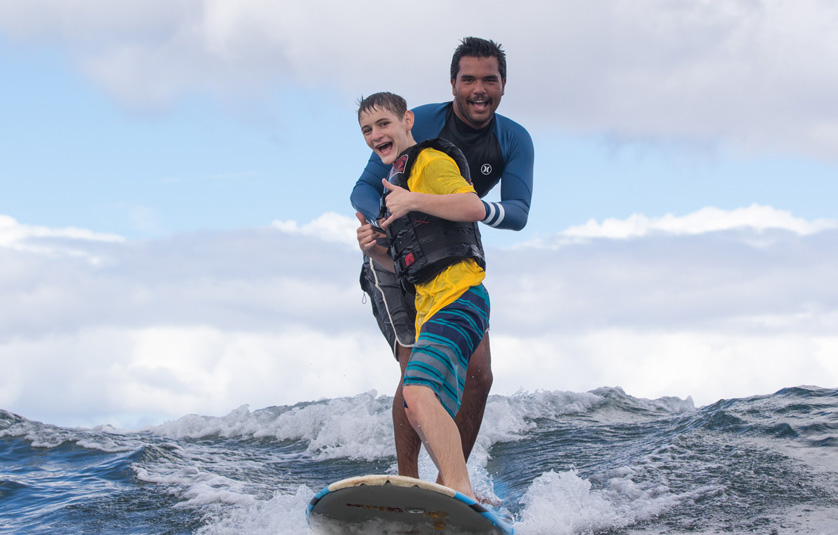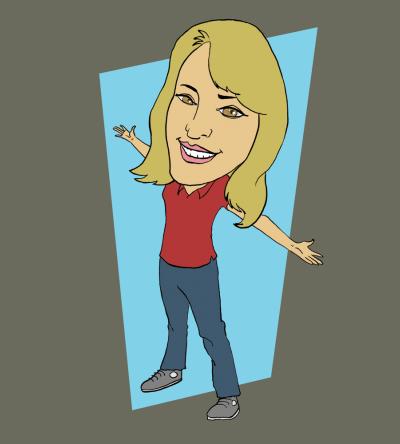- By Christy Moore
- Christy's Corner, Cystic Fibrosis, Genetics, Surfing
- Posted February 26, 2016
Saline Treatments and Surfing's Positive Impact
By now, you probably know that the Mauli Ola Foundation takes kids with cystic fibrosis (CF) surfing as a fun and natural treatment. You may have also skimmed our website to find out more information about why surfing is a natural treatment for CF (see What is Saline?). Now let’s talk a little more about how surfing can have a positive impact for people with CF by looking at the scientific research that inspired James and Charlie Dunlop to start the Mauli Ola Foundation in 2007.
It all started several years ago in Australia, when doctors noticed that their patients with CF who surfed reported clearer lungs after catching some waves. This caused the doctors to question why that was, and wonder if salt water (saline) might be an inexpensive and easily accessible treatment for people with CF. They set up a study to find out.
In order to study the effects of any new treatment, it is important that the study be set up the right way. If every person in the study is given the new treatment, and they all improve, that might be a great sign that the treatment works! There could also be another reason why everyone’s health improved, which could be related to a change in their behavior, medical care or something not related to the treatment being tested.
There is also what is called the “placebo effect,” which means that if we think something is going to work, it will. For example, if you give someone a pill with nothing in it (called a “sugar pill”) and tell them it will improve their mood, that person may report a better mood after taking the sugar pill, simply because they believe it. The placebo effect is very strong.
So because of all of these factors, it’s important that when a new treatment is studied, we have something to compare it to, in order to make sure it’s actually the treatment causing the improvement, and not something else. So we can compare the group getting the new treatment to a group not getting the new treatment. This comparison group is called the “control group.”
This group is given a treatment that does not contain the medicine or substance being tested. During the study, the control group does not know if they are getting the new medicine, or if they are getting the “sugar pill.” In addition, the doctors and researchers don’t know either, so they can’t have a bias while they collect information from the patients. This type of study is called a “double-blind” study, which means both the patients and the doctors don’t know who is in the “study” group and who is in the “control” group. This method is a much more reliable way to test a new treatment.
The Australian researchers set up a double-blind study to see if saline improved the health of people with CF. Their study included 164 people from several Australian clinics who had a confirmed diagnosis of CF. Information was collected from the participants at the beginning of the study, which included various health tests and a quality of life survey. Then they were randomly assigned by a computer to one of two groups: the study group, who were given a 7% saline solution (this is hypertonic, which contains more salt than our bodies), or the control group, who would receive a placebo treatment (0.9% solution, which has the same salt level as our bodies). Both groups inhaled their saline solutions every day. The patients were monitored every few weeks for several months where doctors conducted the same health tests and the patients filled out the same quality of life surveys.
The results were better than expected! When compared to the control group, the study group had shown some improvement in lung function, spent less time in the hospital, used less antibiotics, had missed less work or school, and overall experienced a higher quality of life. This was a very exciting outcome, as saline is natural, inexpensive, and does not have negative side-effects.
This study inspired many people with CF all over the world to not only use saline treatments, but also to spend time in the ocean to help their health. This idea started the Mauli Ola Foundation, which has helped hundreds of kids and families find a fun, natural way to feel better.
Comments
No comments have been submitted.
Education
-
Lisa Andersen, four-time world surfing champion, kicks off Mauli Ola’s eight month campaign for Breast Cancer!
Mar 30, 2016 / Genetics, Surfing -
Saline Treatments and Surfing's Positive Impact
Feb 26, 2016 / Christy's Corner, Cystic Fibrosis, Genetics, Surfing -
What is DNA?
Nov 18, 2015 / Christy's Corner, Genetics -
What is saline?
Nov 11, 2015 / Christy's Corner, Cystic Fibrosis, Surfing -
What is cystic fibrosis?
Nov 04, 2015 / Christy's Corner, Genetics



















































